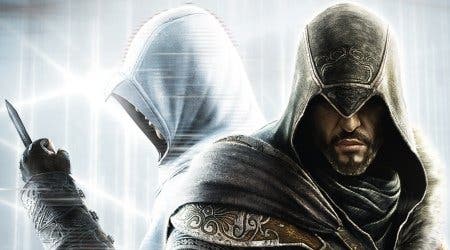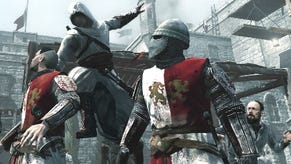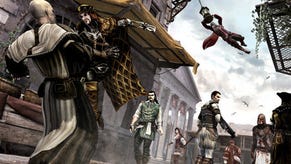Assassin's Creed: Revelations Review
Arrivederci, Auditore.
Ezio Auditore is old, and Assassin's Creed: Revelations doesn't try to hide this. In the third game of the Assassin's Creed 2 trilogy, Ezio is rendered with a pasty face and drooping eyelids. He has a stringy beard that makes his lips appear to pucker out like an overfed goldfish. It's the decay you'd expect for a beloved superstar on his last hurrah. This is Ezio's final appearance as a hero in the series, and appropriately, this game has the feeling of a farewell tour. Like a rock band past its prime, Assassin's Creed: Revelations is everything Assassin's Creed has ever been, and less.
Upon arriving in Constantinople, where the bulk of the main quest takes place, Ezio buddies up with a local member of the Assassins. This young Turk equips Ezio with an enhancement to the familiar hidden blade that has slid its way through so many Templars' necks over the course of the series. Now Ezio's left-handed blade is a hook, too, which he can use to slide along ropes throughout the city, like a little kid on a zipline.
The hook is also used to extend your climbing reach. Once the new tool is in place, though, climbing is no longer the quiet, stealthy exercise it has always been. One of the essential recurring moments in the Assassin's Creed series has been quietly scaling the side of building, like a spider, and enjoying the bliss of creeping where most mortals cannot.
Yet with this new piece of equipment, your climbs are punctuated by the sound of Ezio's metal hook repeatedly striking the wall. The noise itself isn't especially unpleasant, but it's the sound of superfluous gadgetry, and not something that you'd expect to hear from a man who lives his life in shadows. This game is haunted by that sound. Clank, clank, clank.
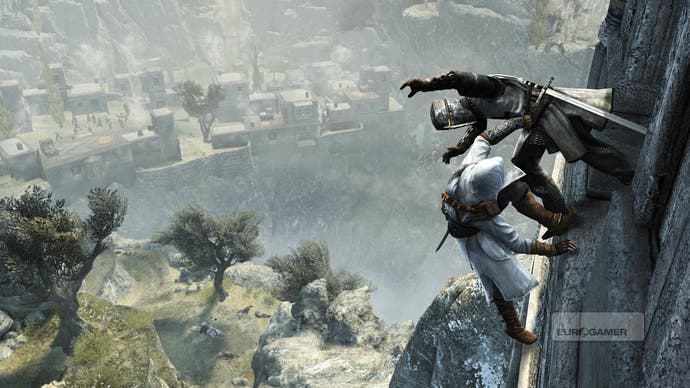
Ezio is in town to recover a set of mystical keys that were hidden in Constantinople by Altair Ibn-La'Ahad, the protagonist of the original Assassin's Creed. While he's conducting his search, however, Ezio uncovers - you guessed it - another Templar conspiracy to seize power. This sinister scheme provides a welcome opportunity to skulk around, pierce enemy strongholds on tense infiltration missions, and of course, execute ornate assassination plots. It's all great fun. If the game concentrated on this stuff, that would be enough. Being Ezio Auditore, Professional Assassin is a premise that still has plenty of juice.
Yet because this is a big finale of sorts, Ubisoft apparently feels the need to lard Revelations with other storylines. So every time you bring one of Altair's keys back to your hideout, the game flashes back to Altair's life and you play a mission in his shoes. These are serviceable diversions, typical Assassin's Creed fare, but because they are isolated incidents on a separate track, they feel inconsequential. Of course the lore of the game explains that everything is connected (cue eerie music), but that's not how it feels.
Then there's Desmond, the "real-life" character who is living out the DNA-embedded memories of Ezio and Altair by way of the Animus machine. Compared to the spicy Ezio, Desmond is hopelessly bland, a tub of sugar-free plain vanilla ice cream, the generic kind. Yet he is given an even more prominent role in Revelations than in previous games (or at least a role that is harder to ignore).
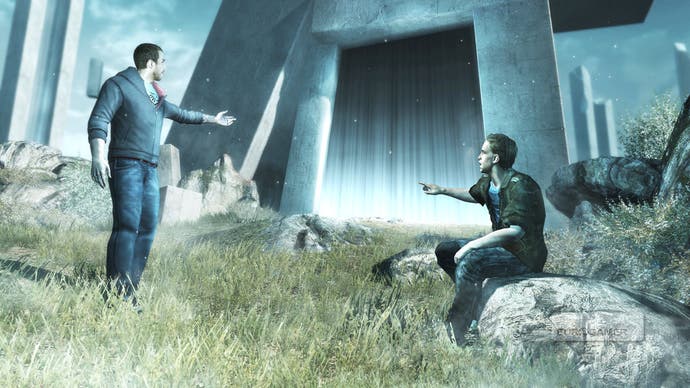
Here is what I regard as an ideal level of Desmond: I want him to show up at the opening of the game and say, "Hello, folks, I'm Desmond Miles. I'm about to step into my magical history machine and pretend to be a fabulously fun and likeable Italian fellow from the Renaissance era. Won't you join me on this thrilling adventure?" Cue title screen, and Desmond goes away. I would also allow him to appear in the credits giving the thumbs-up sign with a word balloon that says, "Thanks for playing!"
"'Hello, folks, I'm Desmond Miles. I'm about to step into my magical history machine and pretend to be a fabulously fun and likeable Italian fellow from the Renaissance era.'"
Instead, after the events that concluded Assassin's Creed: Brotherhood, we join Desmond in limbo on Animus Island, stranded with the memory imprint of his predecessor, Subject 16. The convoluted sci-fi mumbo-jumbo spirals out from there, and Assassin's Creed: Revelations starts to resemble The Matrix: Revolutions, with all the going inside computers and not making so much of the sense.
Animus Island is the venue for a few cut-scenes and some Desmond-focused side missions that are unlocked by collecting "data fragments" as Ezio (this game's equivalent of AC2's feathers). On these missions, you play through spatial puzzles in a first-person perspective while, in voiceover segments, Desmond recalls and reflects on his past, mostly whining about it. He could serve cocktail weenies and show us slides from his recent trip to Machu Picchu, and the narration would be about as gripping. As for the puzzles, they attempt to be visually striking in a minimalist way, and some parts are engaging enough, but I found it hard to shake the impression that I was playing a poor man's Portal.
Don't get me wrong, I like that Ubisoft is willing to experiment with different forms. That creativity is what made Assassin's Creed: Brotherhood such a delight. Brotherhood dared to add elements to the already-successful AC2 foundation that included a brotherhood of assassins who could be trained and called into battle, a citywide fight for territorial influence, and the half-synch/full-synch dynamic that encouraged players to complete missions with a true Auditore flair. Not every new twist was a great idea - the cannon-fire segments in particular were tedious. But overall, Brotherhood worked because the new stuff tended to build out the core concept of virtuous killers whose primary asset is their efficiency and focus.
The new wrinkles in Revelations don't have such a well-defined sense of purpose, and they detract from the game a result. For instance, this entry in the series has a new tower-defence element in which you have to protect your assassins' dens against Templar attacks. It's slow and woefully uninventive, outclassed by any number of tower-defence games you can play for free on the web. Ubisoft is getting complacent here, treating Assassin's Creed as a brand rather than an idea. They slap an Assassin's Creed skin on a standard genre template and think it sufficient. It's not.
Likewise, Revelations has a peculiar fixation on bombs. You can make little bombs and toss them around to kill or distract enemies. There is a large variety of bombs you can craft - sticky bombs that blast shrapnel, say, or sudden-impact bombs that spread poison - and the game obsesses over them all. There are bomb-crafting stations everywhere in Ezio's world, and treasure chests are always foisting more goddamn bomb-making ingredients on you. PLEASE, TRY THE BOMBS!
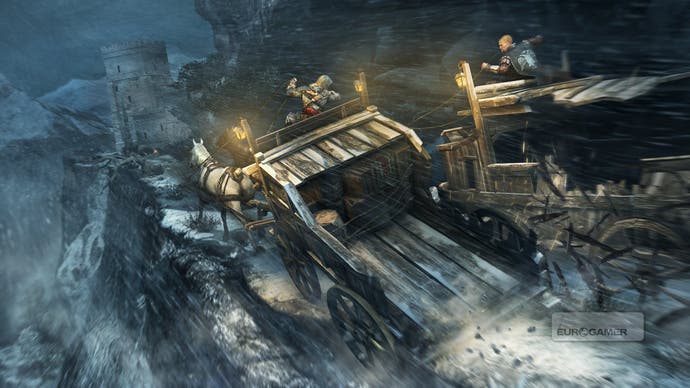
I have tried the bombs (even though they led me even further afield from the ideal of the "padfoot" assassin). They are fine. They are hand grenades, for Pete's sake, which have been present in video games since a couple days after the beginning of time, so it's hard to see what Revelations is so excited about. Yes, there is a wide array of ingredients and combined effects that you can craft, but at the end of the day, you can't escape the fact that all the bombs do pretty much the same thing: they go boom and make a commotion. Well, OK, there are certain metal-shelled bombs that rattle around on the ground for a few seconds before they explode. Clank, clank, clank.
"The disc is redeemed by the presence of the multiplayer game, which is really good and should not get short shrift amid the hype over Ezio's farewell."
Other past glories of the series have been neglected. Remember those wonderful jumping puzzles from Assassin's Creed 2, where it could take the better part of an hour just to figure out how to cross a room? If you could manoeuvre through one of those, hitting the finish line was exhilarating. Revelations has rooms like that, but most of the time, the way to get across is to push forward on the joystick while holding down the trigger and the A button. On occasion, you also have to press the B button to use your hook blade, in which case the game will literally tell you to press the B button to use your hook blade. Somehow the finish line does not feel as sweet.
And remember those wonderfully strange Da Vinci Code-esque puzzles that free-associated on the global conspiracy theme? Those, too, now play a much more subdued role; puzzle-solving has mostly been relegated to Desmond's side quests. The puzzles on Ezio's side of things have been dumbed way down, maybe to suit his doddering old brain, but I feel that even in his golden years, Ezio could handle something a little more complex than "point your cursor at these three rectangles, and the one that lights up is the secret door!"
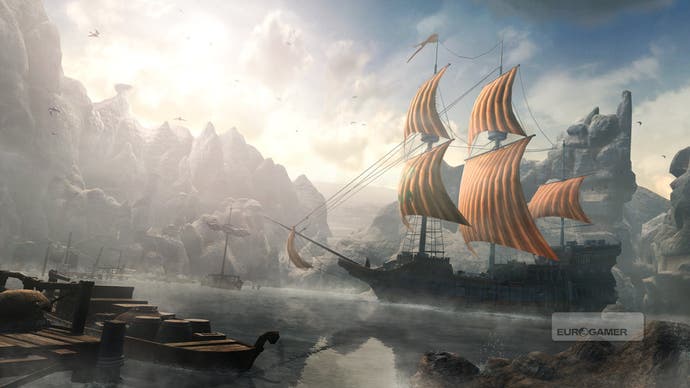
The disc is redeemed by the presence of the multiplayer game, which is really good and should not get short shrift amid the hype over Ezio's farewell. Those who played the multiplayer in Brotherhood will be right at home - Revelations has most of the same play modes, all of which place players on a crowded urban map and challenge them to quietly find and murder each other. There are only a few changes, but one in particular brings the fun of community play to a new level, and that's the (creatively named) Deathmatch mode.
Brotherhood's most intriguing multiplayer mode was Wanted. The idea was that you were given one player in the crowd to hunt down and kill. Fulfill that contract, and you got a new one. Of course, all along there were one or more players who were seeking you out, too. You had to be both canny hunter and cautious prey to succeed. It made a nice thematic fit in the Assassin's Creed world.
Wanted is fun, and it's still around in Revelations, but the trouble with it is that everyone gets a big dumb compass on the screen that points in the direction of their target. Deathmatch is the same as Wanted, but it ditches the compass. You still get indications of when your target is in the area, but you have to heighten your senses of observation to discern your mark amid the bustle, rather than relying on a glowing circle at the bottom of the screen.
What a difference simplicity makes. Deathmatch has more suspense, more subtlety, and requires more guile. I played Deathmatch for hours with a group of complete strangers online - and I usually hate playing with strangers. None of us wanted to stop. We'd try other modes once in a while, but we'd always come back to Deathmatch.
If only the single-player game, which struggles to build momentum, were so well-considered. It's still fairly entertaining amid all its missteps, as the heart of Assassin's Creed perseveres to a degree. The disappointment is that Ubisoft is enamoured with its own glitter here, cramming Revelations so full of unnecessary adornments that there's not as much room for players to bring their own ingenuity and sense of adventure to the table.
Where Brotherhood enhanced the thrill of being Ezio Auditore, Revelations distracts from it. Ezio may look old, but it's the series itself that really shows its age.
